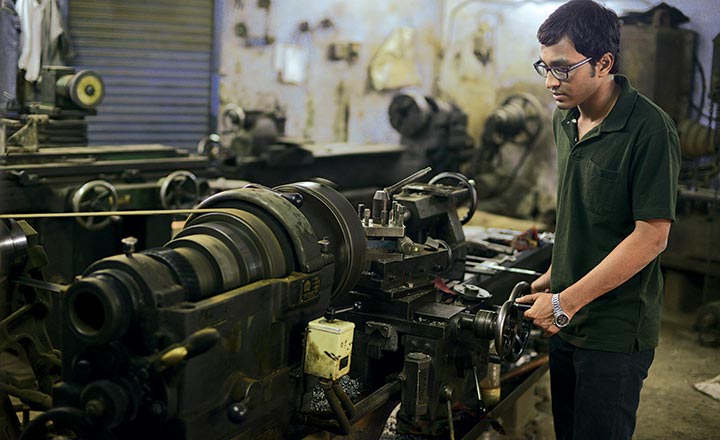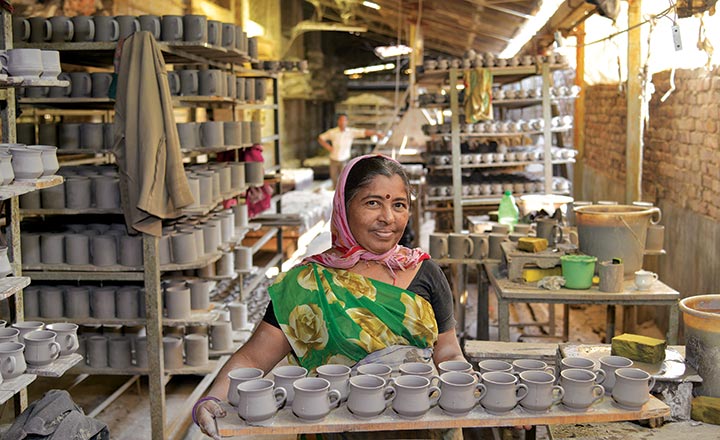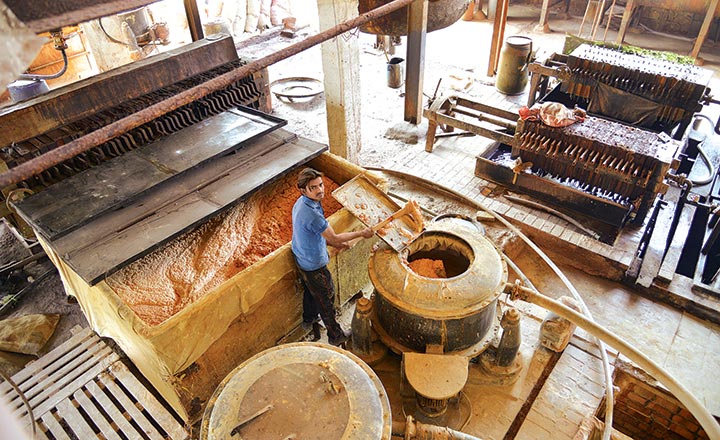The heady aroma of biscuits welcomes us to the office of Global Energy Food Industries. It’s a great way to start the day and when Suresh Bherwani, the company’s managing director offers us cream wafers, it is hard for us to resist the temptation. “We export this to the Middle East, Philippines and West Africa,” says the portly Bherwani, a first generation entrepreneur, with a turnover of Rs.70 crore. Over the next 6-12 months, his biscuits and confectionery products will make their way to Haiti in Central America and Austria, to be followed by the rest of Europe. “Business has been very good and we have been growing by at least 10% each year,” he says.
Bherwani, like most others from the business fraternity of Naroda, presents an optimistic picture of both the business scenario and the general state of affairs at least when it comes to the basic power and water supplies. “A big advantage is the abundant supply of power at reasonable prices. It has been this way for about 15 years now,” says Bherwani, who makes 40 tonne of biscuits every day.
Situated about an hour from Ahmedabad, Naroda was Gujarat’s first industrial area to be developed in early 1964 by Gujarat Industrial Development Corporation (GIDC). Today, it is home to names such as Reliance Industries, PepsiCo India, Havmor, and Dishman Pharmaceuticals.In many ways, the success of Naroda lies in the multitude of industries that it hosts. The cluster caters to different sectors such as chemicals and intermediates, pharmaceuticals, engineering, plastics, textiles, foods and packaging. According to Jatin Patel, president, Naroda Industries Association (NIA), of the 1,200 companies here, as many as 75% are small and medium enterprises (SMEs).

All is well
It’s a busy day for Ajay Patel and he is neck deep in work. In the middle of incessant phone calls, he gives us a lowdown on what it is like to do business in Naroda. “The first common effluent treatment plant in Naroda came up in 1996. That was a turning point in the development of our industry here,” he says. Patel’s Akash Dyes and Intermediates which does a turnover of Rs.30 crore, is one of the 250 units that is in the business of chemicals and intermediates. What comes out of these units generate a revenue close to Rs.2,500 crore and goes into the manufacturing of dyestuff for the textile industry. This is the largest industry in Naroda, followed by Active Pharmaceutical Ingredient (API) manufacturing, with about 200 units.
Akash Dyes has three units in Naroda which make sulpho tobias acid, that is used as an intermediate for dyestuff. Till about a year ago, as much as 70% of his raw material was procured from China, with the rest from India. “We started sourcing from China because it was 10% cheaper. This makes a huge difference in our business, where over 70% of the cost is raw materials,” he explains. However, with China’s chemical industries under the cloud of environmental-related issues, Patel says, there will be greater sourcing from India. He is hoping that sourcing larger volume will not only save time but also fetch him a better rate.

In fact, GST is not really at the core of the conversation in Naroda. For most of them, tackling increasing competition and rising labour costs is what is keeping them busy. Take the case of Ramesh Patel, who manufactures mustard oil under the Trishul brand name. “Many brands from China and other parts of Asia have entered the market in recent times. We are fighting to increase our share of the pie,” he says. In FY17, his company clocked a turnover of Rs.8 crore and Patel says revenue will be up by 10-12% in FY18. Given the increasing competition, the focus this year is on marketing. “We may not make any fresh investments this year to increase capacity. Instead, we will make additional investments in marketing to increase our brand recall,” adds Patel.
Achilles heel
A few kilometers away, labourers are offloading sesame seeds from a truck with an Uttar Pradesh registration plate. “The crop here has been affected because of the rain and we have been forced to source outside Gujarat,” says Puran Karira. He is the proprietor of Keshav Til Factory, which processes natural and hulled sesame. “For many years, we used to do this manually but automation of the process has made it more hygienic,” he explains.
Karira is peeved about rising labour costs, which have gone up by 15-20% last year. “It’s not easy for us to absorb that kind of increase. Besides, we have to contend with competition from China and Guatemala,” he says. His unit which generates a revenue of Rs.5 crore and exports all its output. While he is uncomfortable disclosing his clientele, Karira says many restaurants in Asia serve it with their food.
In fact, almost everyone we spoke to said availability of skilled labour is a constant challenge in this cluster. It is this perennial demand-supply gap that keeps pushing labour costs higher every year. Dinesh Patel, whose father set up ShivShakti Ceramic Industries, is looking to expand his capacity but he is worried about staffing his new unit given the lack of quality labour. His ideal candidate is someone with a diploma in ceramic design while Morbi has them in hordes, Patel says not many are willing to relocate to Naroda. So until the local ITIs offer a similar course, he has to make do with unskilled labour. “We waste months training unskilled labour and that takes away our attention from the business,” he says.
On his table rests an array of ceramic cups, saucers and bowls. He sells them through small cutlery shops and malls. Labour woes aside, business is growing steadily for him. “Maharashtra is my biggest market,” says Patel, who does a turnover of Rs.2 crore. And what’s more the GST regime has left him happier; he pays 12% compared to the 21% he paid earlier through excise and VAT. The steady growth has given him the confidence to open another unit. “We are running at full capacity and are not able to execute fresh orders,” he explains. So, he plans to set up another unit to cater to the increasing demand. “There is no space left in Naroda, today, and I have no option but to go out. Even if land is available, it costs at least Rs.20,000 per square metre,” he says. NIA’s Patel concedes that is a cause of concern. “Only two years ago, land was available at Rs.15,000 per square metre and it has gone up by 35% because of better infrastructure,” he explains.

No cash, no problem
Though Naroda, as an industrial cluster, has a lot going for itself, that was not always the case. NIA’s Patel says the radical change took place after 2006. “A lot of infrastructure like roads, street lights, storm water drains came up then. All that has kept industry happy,” he insists. His day job is running Rama Polycon, a company making plastic intermediate for packaging materials. Despite the initial hiccups that came with the implementation of GST, the company’s revenue is likely to see a 20% increase to Rs.50 crore in FY18 from Rs.42 crore in FY17, driven by higher demand from businesses like alkalies and chemicals. “We never dealt in cash nor did any of our customers. That ensured growth was unaffected,” says Patel. In fact, he insists this has been one of the best years for him. He says his expansion plan will continue unhindered as his clients such Gujarat Alkali and Deepak Nitrate are also expanding their capacities and he has to keep pace with them. “GST has made no difference to my business. If it has, it is only positive.”
Shailesh Patel, who owns Bhavani Industries, a manufacturer of metallic acid and resist salt, thinks the decision to stay away from cash, right from the beginning, was a smart one. “For at least 15 years, I have had very few dealings in cash,” says the owner of the Rs.18 crore business.
The rub has been in the investment needed for upgrading the systems to make them GST ready. Ankit Chona, managing director, Havmor Ice Cream says his company spent about Rs.1 crore on SAP and IT updates. “The level of complexity has reduced but some help from the government on execution would have helped,” he says.
Chona’s manufacturing plant was set up in Naroda about a decade ago. Gujarat, which brought in all his revenue at one point, accounts for just half today. “A big advantage of a uniform tax rate is that we can sell ice creams across the country,” he points out. While he concedes that in a market like Uttar Pradesh, the tax is higher now (7% in the past versus 18% today), it does seem worth the effort. “Other factors like lower cost of credit and stability in the price of raw materials makes expansion a lot more feasible,” adds Chona.
While Naroda has better infrastructure in place compared to other industrial clusters, there are still some niggling concerns. For one, connectivity by road can be arduous if one is stuck in peak-hour traffic it can set you back by at least an hour (it’s a 30 minute drive otherwise). NIA’s Patel says workers have it easy now, with more buses from central Ahmedabad. “They operate every 15 minutes. Once the Ahmedabad Metro becomes a reality, it will be a different story,” he avers. Today, Naroda employs over 60,000 workers, an increase of 10,000 over the past 4-5 years. Since migrant workers make up 40% of the labour force, NIA is developing residential quarters for them and the first few blocks that can house about 900 workers have been constructed.
But, on the state of business, the folks here are an upbeat lot. Karira, for instance, says the problems are not unique to Naroda. “In a changing business scenario, we have been able to maintain revenues and profitability. Our investment for the next fiscal is on track. What more can one ask for?” he asks.
Naroda is sitting pretty with a bunch of plucky businessmen, who work closely with the local body of the government. NIA’s Patel says industrialists in Naroda are responsible for putting up hospitals and the common effluent plant for industries. “We invest a lot of time to ensure that there is no issue as far as ease of doing business is concerned,” he says. While the rest of the country is still dealing with the change that GST has brought in, for Naroda at least, it is business as usual.











